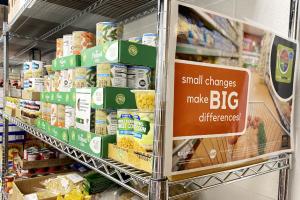PEORIA, Ill. - Food pantries serve as an invaluable asset in the community, providing both food and essential household and hygiene products to families in need. St. Paul’s Episcopal Church food pantry in Peoria looked to University of Illinois Extension’s Supplemental Nutrition Assistance Program—Education (SNAP-Ed) for expert advice implementing new systems and policies within their food pantry to better ensure nutritious food is offered and pantry guests’ needs are met.
The pantry implemented a “shopping style” layout, adopted a nutrition policy, and added new signage. The “shopping style” is considered the client choice model. Shoppers are able to shop through the pantry similar to a grocery store, choosing the items that best meet their needs. Each person in line is given a personalized shopping time in an effort to maintain distance and retain dignity in choosing the foods for their family.
“Shopping style is one way for a pantry to give their guests control over what foods they will take home to their families,” explained Rebecca Crumrine, Extension SNAP-Ed program coordinator. “This style offers opportunities to interact, increases the probability guests will talk about their food and health needs, and cuts down on food waste.”
Emily Waite, St. Paul’s food pantry manager, first met SNAP-Ed staff through Food Pantry Network—HOI. After attending nutrition policy training co-hosted by SNAP-Ed in April 2021, Emily created a nutrition policy with the help of church leadership and adopted the policy in Fall 2021. During this time, SNAP-Ed staff worked with Emily to help bring new nutrition signage and education to the pantry environment. The signs enhance the guest’s experience and add messaging to help guests make healthier choices.
In addition to these changes, the pantry adopted the Greenlight Project labeling system. This system uses stickers and signage to identify healthier foods that help manage chronic diseases. With this labeling, guests can easily identify nutritious options to support their family’s health.
“Food insecure communities often rely on food pantries to help meet their family’s needs,” states Kaitlyn Streitmatter, SNAP-Ed educator. “The traditional, non-perishable items often found in pantries can help provide food to those in need; however, we know that some of these items are not going to be the best choices for general health or for those dealing with diet-related chronic diseases, such as hypertension or diabetes. We work with food pantries to assist them with a variety of new systems to help improve the healthy food options.”
If you are interested in learning more about the Greenlight Project, check out a video featuring St Paul’s Pantry here: go.illinois.edu/greenlight. To connect with University of Illinois Extension SNAP-Ed staff visit extension.illinois.edu/fmpt.
Source: Rebecca Crumrine, SNAP-Ed program coordinator, racrumri@illinois.edu
About Extension: Illinois Extension, the public outreach and engagement arm of the University of Illinois, translates research-based knowledge into actionable insights and strategies that enable Illinois businesses, families, and community leaders to solve problems, adapt to changes and opportunities, make informed decisions, and carry technical advancements forward into practice.
